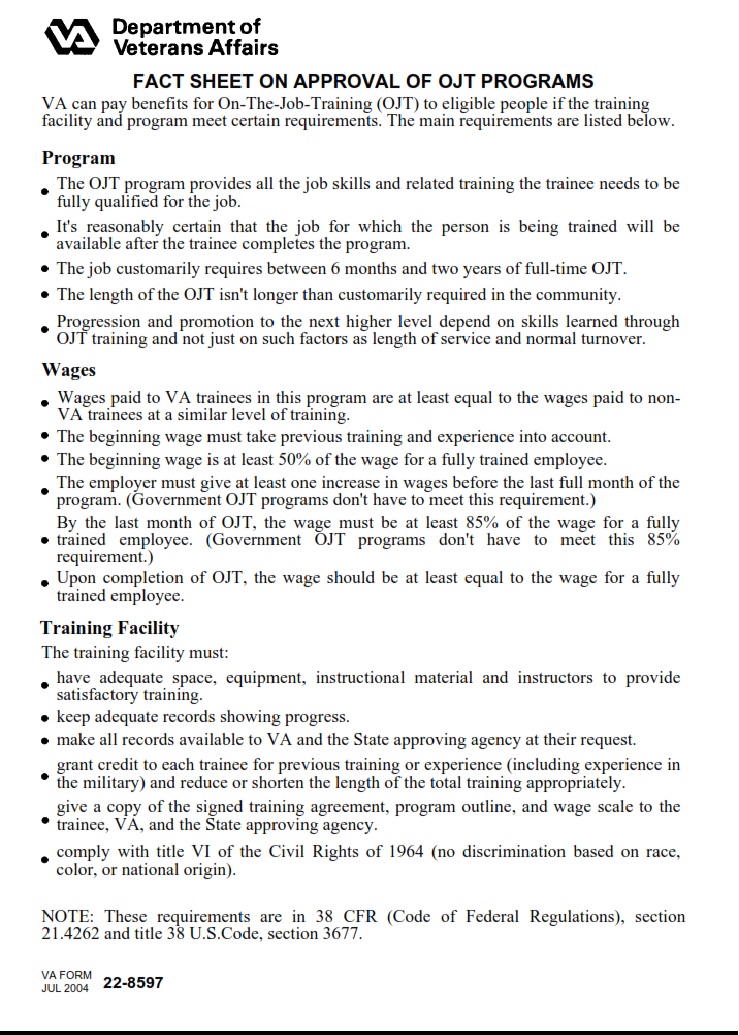VAFORMS.NET – VA Form 22-8597 – Fact Sheet on Approval of OJT Programs – Whenever you apply for an OJT promotion, you should submit the VA Form 22-8597. This form contains all the information you need to file an OJT promotion. It also contains a fact sheet on the approval of an OJT promotion.
Download VA Form 22-8597 – Fact Sheet on Approval of OJT Programs
| Form Number | VA Form 22-8597 |
| Form Title | Fact Sheet on Approval of OJT Programs |
| Edition Date | May 2022 |
| File Size | 274 KB |
VA FORM 22-8597 (1544 downloads )
What is a VA Form 22-8597?
Those seeking to train for commercial pilot certification and other VA vocational flight training can use the VA Form 22-8597 to receive approval for the program. This form is used by officials at the Department of Veterans Affairs to determine whether a training center is eligible to receive VA education benefits.
The form outlines the requirements for flight schools and flight engineering schools. It also explains what courses are required to obtain a pilot rating. It specifies how to determine if a school’s curriculum meets the standards of the FARs.
The FAA requires flight schools to have an FAA certificate and a pilot school certificate. In addition, flight schools may offer ground school programs. For example, a school may offer a home study ground school program or an audiovisual ground school program.
Part 141 of the FARs states that training establishments must have a standard course outline and program. They must certify that their wages are not less than those of a non-VA trainee in the same position. The establishment must also maintain adequate records of its trainees’ progress. The establishment must issue a certificate of completion for each VA trainee.
The training establishment must certify that VA trainee wages are increasing in regular periodic increments. The salary of a VA trainee must be at least 50% of the wage of a non-VA trainee in the position. This rate must be raised to 85 percent of the job wages by the end of the training period.
Where Can I Find a VA Form 22-8597?
Upon completing VA training, a trainee must be certified to work for a particular job. This certification must be issued by the employer and must identify the job that was trained for. The training establishment must maintain adequate records of the trainee’s progress and must be able to certify that the trainee is not a disqualified candidate for a job.
The wages of a trainee must meet the prevailing wage rate, which is established through an agreement between the union and the employer. The wage must increase in periodic increments. This ratio must be at least eighty-five percent of the wage at the job that was trained for. If a trainee is paid at a journeyman wage rate, the trainee may not accept a wage decrease in order to qualify for VA benefits.
In addition to the prevailing wage rate, the apprenticeship program must also require the training establishment to provide a list of the outlines of the training program and the wages that were to be paid. The establishment must also provide copies of the training agreements.
The training center certificate must include a list of each location where the program is approved. In addition to this, the establishment must be certified to be in compliance with all of the provisions of law and regulations.
VA Form 22-8597 – Fact Sheet on Approval of OJT Programs
Taking advantage of an OJT program isn’t limited to those with a knack for numbers. For example, an FHWA OJT program targets underrepresented groups in highway construction. The program also supports apprentices and internships and offers a number of high-paying positions to veterans and other interested parties. If you’re interested in taking part in one of these programs, it’s a good idea to explore all your options. OJT is a great way to enhance your skill set, but you should be selective about the positions you accept. The best way to do this is to be upfront about your qualifications and to be honest with your employer. If you’re interested in the program, contact your local FHWA office to inquire about current opportunities. You can also learn more about the program by visiting the FHWA website.
While it’s not always possible to learn the correct information about your particular training program, you can get some valuable advice from an industry expert. A career development specialist can evaluate your current skills and help you find the right fit for your OJT requirements. The best part is that you can work with them to get the most out of your training program. After all, no one wants to be stuck in a dead-end job.
